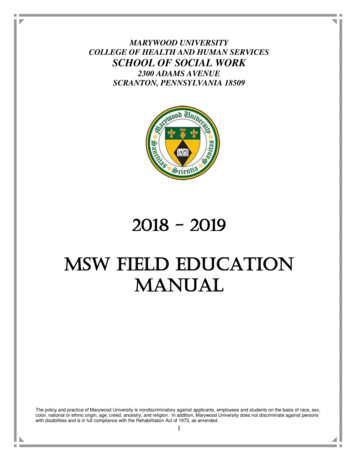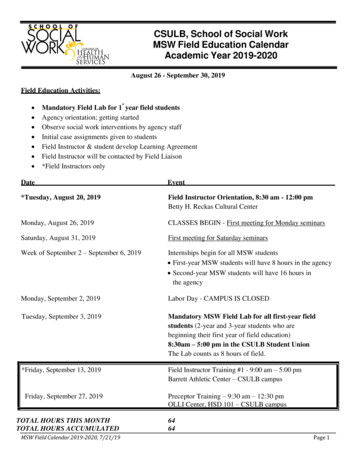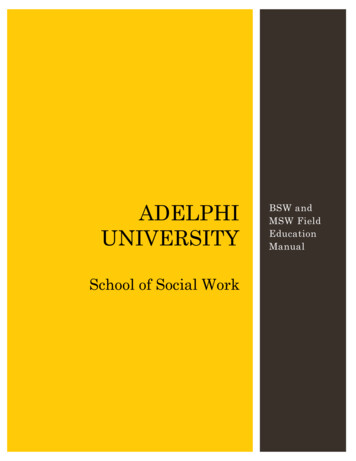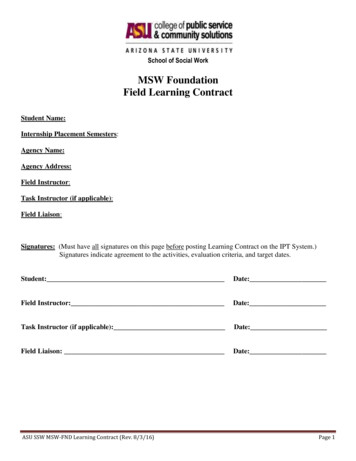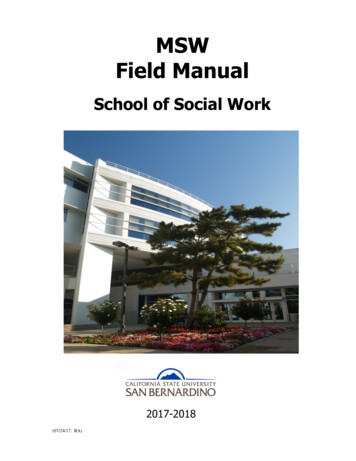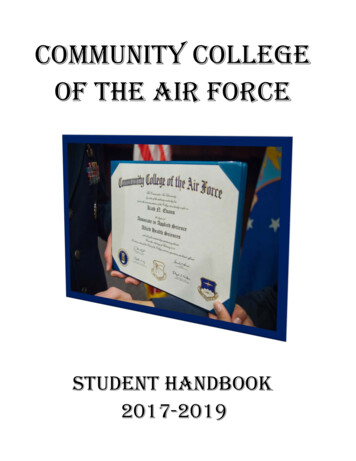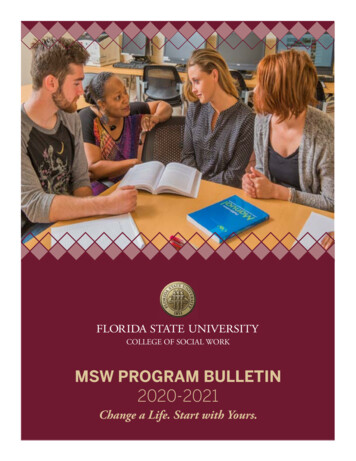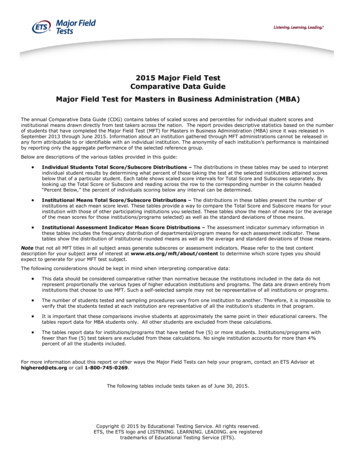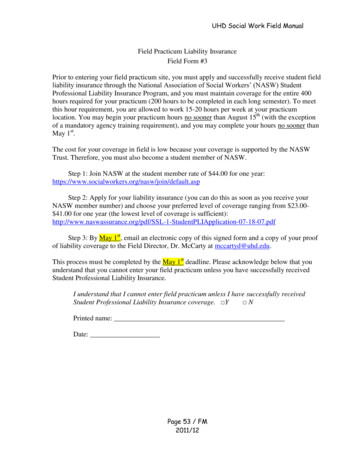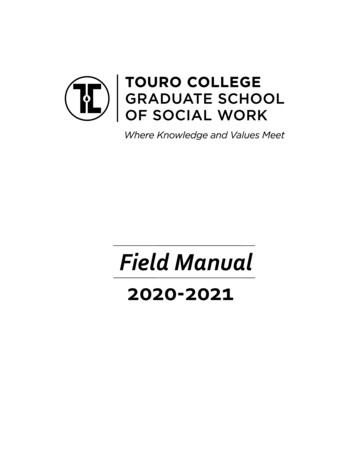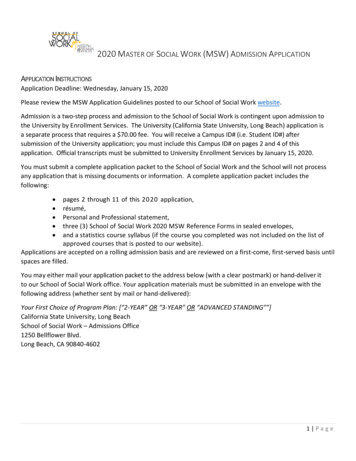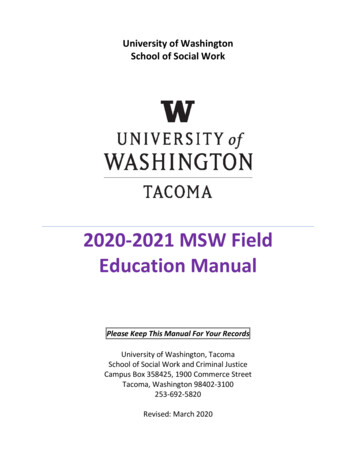
Transcription
University of WashingtonSchool of Social Work2020-2021 MSW FieldEducation ManualPlease Keep This Manual For Your RecordsUniversity of Washington, TacomaSchool of Social Work and Criminal JusticeCampus Box 358425, 1900 Commerce StreetTacoma, Washington 98402-3100253-692-5820Revised: March 2020
Introduction to the 2020-2021 Social Work DivisionMSW Field ManualImportant information – Please Read!This manual serves students and field instructors as a guide for important resources, processes,documents and policies necessary for a full understanding of the requirements of fieldeducation. Comprising almost half of a student’s required course credits, field education (aka“practicum”) is the signature pedagogy of social work. Through field education, a student isprovided with an opportunity to apply classroom learning to practice with individuals, families,groups, organizations, communities, and policy makers under the supervision of an experiencedsocial worker.If you have questions about anything in this manual, please do not hesitate to contact us. Toour Field and Task Instructors: thanks for your hard work with new social work students—yourefforts are deeply appreciated. To our students: thanks for being such great representatives ofthe UW Tacoma School of Social Work and Criminal Justice.What’s New this Year?The UW Tacoma Social Work Program is now the School of Social Work and Criminal JusticeIn September, 2019, the UWT Social Work and Criminal Justice Program was granted Schoolstatus within the University system. So we are now the UW Tacoma School of Social Work andCriminal Justice. We retain our accreditation affiliation with the UW School of Social Work inSeattle—but you now may hear of us referred to as The Schools. We are in the midst of anationwide search for an inaugural Dean of the UWT School and will keep you posted as thatprocess moves forward. While you won’t probably notice any difference other than our name,within the University and academic community it actually does make a difference.Welcome to Chris Barrans, MSW, our new Field Faculty Member!!We are very excited to welcome Christopher Barrans, MSW, as our new Lecturer/FieldCoordinator. Some of you already know Chris though his part-time role as Off-Site FieldInstructor, but starting in Autumn quarter of 2020, he will be joining the School as a full timeField Faculty member. Chris will be working primarily with undergraduate students and theirpracticum placements, but can be called upon with any field-related question. We are soexcited to have Chris on board and know that he’ll be a strong partner with all of our agencies,Task Supervisors, and Field Instructors. Welcome, Chris!!!Tom Diehm, PhD, MSW, MAField Director & Principal Lecturer2020-2021 UWT MSW Field ManualPage 1
Table of ContentsIntroduction to the 2020-2021 UWT MSW Field Education Manual . 1The UW Tacoma School of Social Work and Criminal Justice & The UW School of Social WorkMission and Goals of the Schools . 4Mission of the UW School of Social Work . 4Program Goals of the UW Tacoma Social Work Division. 4UW Tacoma Social Work Faculty and Staff and CWTAP Faculty and Staff . 4The MSW Curriculum . 5Council on Social Work Education Competencies and Practice Behaviors . 6Field Education in the MSW Program: An Overview for Everyone. 11Quick Reference to Field Education Terminology . 11FAQs and Short Answers. 12Approach to Field Education in the MSW Program. 13Duties and Responsibilities of UW Tacoma Field Faculty. 13Field Education in the MSW Program: Agencies & Field Instructors . 15Standards and Procedures for Certification of Agencies as Field Sites . 15Expectations of the Agency . 16Expectations and Responsibilities of the Field Instructor . 17Field Instructor Training. 18Field Instruction Policies of the UW Tacoma MSW Program . 19Policy and Procedural Guidelines for Appointment to Affiliate Instructor Status . 20Field Education in the MSW Program: Students . 22Requirements for Credit . 22Procedures for Student Placement in Field Agencies . 22Foundation Placement Process . 22Concentration/Advanced Placement Process . 23K-12 School Social Work Certification . 24General Policies for Students . 24Registration Required to Begin and Continue in Field. 24Academic Standing Requirements to Start Practicum. 24Employment Conflicts . 25Background Checks and Fingerprinting . 25Immunizations . 25Additional Field Hours May be Required in Certain Circumstances. 25Termination from Practicum. 26Field Education at the Field Agency: Agencies, Field Instructors, and Students . 27Placements in an Agency of Employment . 27Counselor Credentialing . 27Accommodations Due to a Disability. 272020-2021 UWT MSW Field ManualPage 2
Harassment and Discrimination . 28Scheduling of Field Education Hours . 28Foundation Field Education . 28Advanced Field Education . 29Early Start Dates. 29“Block” Placements . 29University Breaks . 29Holidays and Inclement Weather Days. 29Sick Time . 29Scheduling Absence from Field Site . 30Grading . 30Incompletes in Field Education . 30Grades of “No Credit” in Practicum . 30Mandatory Reporting . 30Safety and Transportation . 31Guidelines for Enhancing Safety and Minimizing Risk in the Field . 31Exposure to Pathogens or Toxic Substances. 31What Students Should Do if Attacked, Injured, or Seriously Threatened During FieldTime . 32Transportation . 32Suspension or Termination of Placement . 32Concerns of the Field Instructor About the Student . 33Concerns of the Student About the Field Instructor or Agency . 33Situations in which immediate suspension or termination of a placement is necessary 33Policy Regarding Dismissal from the MSW Program for Failure in Field Placements . 34Other Field Placement Suspensions . 34STAR: Learning Contracts and Quarterly Evaluations. 35STAR: System to Administer Records. 35The Foundation Educational Learning Contract . 35Developing Foundation Level Learning Activities . 36The Advanced Educational Learning Contract . 37The Quarterly Evaluation . 37AppendicesAppendix A: Request for Field Placement in an Agency of Employment . 39Appendix B: Acknowledgement of Risk Form . 42Appendix C: MSW Foundation Education Learning Contract. 45Appendix D: MSW Advanced/Concentration Learning Contract . 50Appendix E: Key to Rating Scale for Field Instructors to Rate Students. 54Appendix F: Policy & Procedures Regarding Dismissal from Field Placements . 57Appendix G: Information regarding U.S. Dept. of Labor Standards for Practicumplacements . 592020-2021 UWT MSW Field ManualPage 3
The UW Tacoma School of Social Workand Criminal Justice & The UW Schoolof Social WorkMission and Goals of the SchoolsThe Social Work Division of the UW Tacoma School of Social Work and Criminal Justice (“TheSchool”) is accredited jointly with the School of Social Work at the UW Seattle campus. Weshare a Mission Statement and are closely aligned with their Program Goals. The Tacoma andSouth Sound regions, however, are different in many ways from the Seattle area and the UWTacoma Social Work Division (“The Division”) places an additional emphasis on providing accessto both the BASW and MSW degrees to residents of our area. As part of the larger, urbanserving mission of the Tacoma campus, we greatly value community-based research andservice, and providing four-year UW educational opportunities to students who have notpreviously had access—especially those from underserved communities who are the first intheir families to pursue a college degree.UW School of Social Work Mission Statement: https://www.tacoma.uw.edu/social-work/aboutUW Tacoma MSW Program Goals: oalsUW Tacoma Social Work Faculty & StaffTBA, Inaugural DeanChristopher Barrans, Lecturer & Field Coord.Anindita Bhattacharya, Assistant ProfessorErin Casey, ProfessorTom Diehm, Principal Lecturer & Field DirectorCharles Emlet, ProfessorRich Furman, ProfessorMichelle Garner, Associate ProfessorMarian Harris, ProfessorJaeRan Kim, Assistant ProfessorGillian Marshall, Assistant ProfessorRonnie San Nicolar, LecturerClaudia Sellmaier, Assistant ProfessorDiane Young, ProfessorTerri Simonsen, Program AdministratorDayna Childs, BASW Academic AdvisorJennifer Mitchell, Program CoordinatorKelly Tyrrell, Program Assistant2020-2021 UWT MSW Field ManualPage 4
Child Welfare Training and Advancement Program Faculty & StaffRick Butt, MSW, DirectorKeli Drake, MSW, Field InstructorHermenia Jackson, MSW, Field InstructorMahealani, Kalilikane, MSW, Field InstructorMoniquetra Slater, MSW, Field InstructorAdriana Garza, Program CoordinatorSusan Welk, Program CoordinatorMSW CurriculumThe Council on Social Work Education (CSWE), through its Educational Policies and Standards (EPAS),sets the overall goals for social work education at both the undergraduate and graduate level. Thesegoals are manifested through nine Core Competencies and the Practice Behaviors that accompany them.The Practice Behaviors are measured in the classroom through in-class content, readings, andassignments. Through Field Education and the practicum experience, mastery of the Competencies isachieved through the development and mastery of Learning Activities in the individual field site.The MSW program is designed to educate students in generalist social work practice at the Foundationlevel, with specialization occurring at the Advanced/Concentration level. In the part-time UW TacomaProgram, MSW students usually complete their degree in three years. The first six quarters (Foundationcurriculum) are focused on establishing foundation level skills and knowledge, as well as instilling adedication to social work values, ethical practice, and professionalism. The Advanced curriculum focuseson the integration of practice skills, values, and knowledge in an area of concentration and practicespecialization, to include specialized field placements.The UW Tacoma also offers an Advanced Standing option for qualified students with a Bachelor’s degreein Social Work or Social Welfare. These students, having obtained Foundation skills in theirundergraduate program, join the existing 3-year cohort for their Advanced curriculum and fieldplacement.A standard model of study for 3-year MSW students is located at ogram-study.The Advanced Standing model of study can be viewed at: standing-program-studyCourse descriptions (both required core classes and selectives) can be viewed w.html2020-2021 UWT MSW Field ManualPage 5
Competencies and Practice BehaviorsFoundation MSW StudentsFollowing are the nine Core Competencies and accompanying Foundation and Advanced PracticeBehaviors which students are expected to master by the time they complete their MSW classroomcourses and practica:Competency 1: Demonstrate Ethical and Professional BehaviorFoundation Level Practice BehaviorsPractice Behavior A: Make ethical decisions by applying the standards of the NASWCode of Ethics, relevant laws and regulations, models for ethical decision-making,ethical conduct of research, and additional codes of ethics as appropriate to context.Practice Behavior B: Use reflection and self-regulation to manage personal values andmaintain professionalism in practice situations.Practice Behavior C: Demonstrate professional demeanor in behavior; appearance; andoral, written, and electronic communication.Practice Behavior D: Use technology ethically and appropriately to facilitate practiceoutcomes.Practice Behavior E: Use supervision and consultation to guide professional judgmentand behavior.Advanced/Concentration Level Practice BehaviorsPractice Behavior A: understand and identify the role of a social worker in crossdisciplinary settings.Practice Behavior B: identify opportunities to assume leadership roles in the creation,implementation, and/or evaluation of research-informed intervention programs.Practice Behavior C: apply social work ethical principles to the design, implementation,and/or evaluation of research-informed intervention programs.Practice Behavior D: engage in reflective practice.Competency 2: Engage Diversity and Difference in PracticeFoundation Level Practice BehaviorsPractice Behavior A: Apply and communicate understanding of the important ofdiversity and difference in shaping life experiences in practice at the micro, mezzo, andmacro levels.Practice Behavior B: Present as learners and engage clients and constituencies asexperts of their own experiences.Practice Behavior C: Apply self-awareness and self-regulation to manage the influenceof personal biases and values in working with diverse clients and constituencies.2020-2021 UWT MSW Field ManualPage 6
Advanced/Concentration Level Practice BehaviorsPractice Behavior A: recognize and manage personal biases as they affect theprofessional relationship in the service of the clients’/constituents’ interests.Practice Behavior B: understand the many forms of diversity and difference and howthese influence the relationship with clients/constituents.Competency 3: Advance Human Rights, and Social, Economic, andEnvironmental JusticeFoundation Level Practice BehaviorsPractice Behavior A: Apply understanding of social, economic, and environmentaljustice to advocate for human rights and the individual and system levels.Practice Behavior B: Engage in practices that advance social, economic, andenvironmental justice.Advanced/Concentration Level Practice BehaviorsPractice Behavior A: articulate the potentially challenging effects of economic, social,cultural and global factors on client/constituent systems.Practice Behavior B: advocate at all practice levels for the creation and implementation ofintervention programs that promote social and economic justice and diminish disparities.Practice Behavior C: act as a change agent to promote social, economic, and environmentaljustice and diminish the impact of injustices.Competency 4: Engage in Practice-informed Research and Research-informedPracticeFoundation Level Practice BehaviorsPractice Behavior A: Use practice experience and theory to inform scientific inquiry andresearch.Practice Behavior B: Apply critical thinking to engage in analysis of quantitative andqualitative research methods and research findings.Practice Behavior C: Use and translate research evidence to inform and improvepractice, policy, and service delivery.Advanced/Concentration Level Practice BehaviorsPractice Behavior A: apply critical thinking to evidence-based interventions and bestpractices.Prac
School of Social Work . 2020-2021 MSW Field Education Manual. Please Keep This Manual For Your Records. University of Washington, Tacoma School of Social Work and Criminal Justice Campus Box 358425, 1900 Commerce Street Tacoma, Washington 98402-3100 253-692-5820 . Revised: March 2020 .
